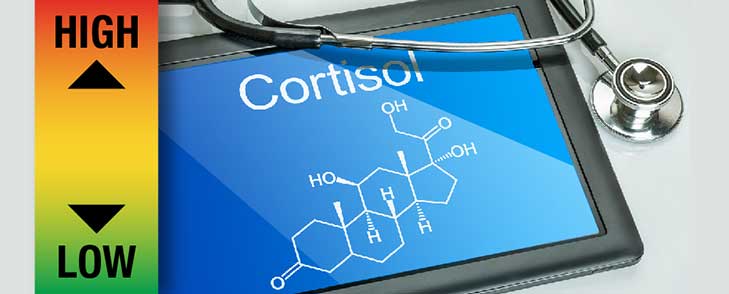Cortisol, often referred to as the “stress hormone,” plays a vital role in nearly every major system in the body. Produced by the adrenal glands, it influences metabolism, immunity, blood pressure, and the body’s response to stress. Though essential in moderation, chronically elevated cortisol levels can lead to serious health consequences.
This in-depth guide explores the full spectrum of cortisol’s function, the risks of imbalance, symptoms of high and low levels, and science-backed methods to restore optimal hormonal health.
What is Cortisol? A Critical Hormone for Survival and Balance
Cortisol is a glucocorticoid hormone released by the adrenal cortex in response to signals from the hypothalamic-pituitary-adrenal (HPA) axis. It follows a diurnal rhythm, peaking in the early morning to help us wake up and tapering off by evening to prepare the body for rest.
Cortisol helps regulate:
- Glucose metabolism
- Blood pressure maintenance
- Immune function modulation
- Inflammation control
- Stress response and mood regulation
In small, short bursts, cortisol is a survival enhancer. In chronic doses, it becomes a silent threat.
Cortisol and the Stress Response: Fight or Flight
Under acute stress—whether physical or psychological—the body activates its “fight-or-flight” response, leading to an immediate release of cortisol and adrenaline. These hormones increase alertness, raise blood sugar, and suppress non-essential systems like digestion and reproduction.
When stress is resolved, cortisol levels should fall. However, chronic stress, from work, trauma, sleep deprivation, or inflammation, causes persistent cortisol secretion, placing the body in a prolonged state of alert that can wear down health.
Signs and Symptoms of High Cortisol Levels
Elevated cortisol levels over time—also known as hypercortisolism—can trigger a range of physical, mental, and emotional symptoms:
- Unexplained weight gain, especially around the abdomen and face
- Chronic fatigue and disrupted sleep patterns
- Frequent illness or infections due to immune suppression
- Anxiety, irritability, or depression
- High blood pressure and heart palpitations
- Decreased libido and reproductive issues
- Digestive problems, such as bloating or IBS-like symptoms
- Cognitive issues like brain fog, forgetfulness, and poor concentration
If left unchecked, chronic high cortisol can contribute to conditions like Cushing’s syndrome, type 2 diabetes, osteoporosis, and cardiovascular disease.
Low Cortisol: A Lesser-Known But Serious Concern
While high cortisol gets more attention, hypocortisolism—abnormally low cortisol levels—can be just as dangerous. This condition often arises from adrenal fatigue, Addison’s disease, or long-term steroid use.
Symptoms of low cortisol include:
- Severe fatigue and low stamina
- Dizziness and salt cravings
- Low blood pressure
- Mood swings and apathy
- Muscle weakness
- Low blood sugar (hypoglycemia)
- Weight loss and digestive issues
Proper diagnosis and medical treatment are critical when addressing abnormally low cortisol levels.
Testing Cortisol Levels: How to Know Where You Stand
Cortisol levels can be measured through several diagnostic tests:
- Blood tests – Best for detecting cortisol levels at a specific time
- Saliva tests – Show daily fluctuations; often used in diurnal rhythm assessments
- Urine tests – Reveal cortisol metabolites over 24 hours
- Dexamethasone suppression test – Evaluates cortisol feedback loop efficiency
Normal cortisol values fluctuate depending on time of day and testing method. Interpretation should always be done with a healthcare provider.
Natural Ways to Lower High Cortisol Levels
When stress becomes chronic, restoring cortisol balance is crucial. Here are proven strategies to naturally reduce cortisol:
1. Prioritize Quality Sleep
Cortisol and sleep are tightly linked. Aim for 7–9 hours of consistent, high-quality rest each night. A dark, cool, and quiet environment supports melatonin and circadian balance.
2. Exercise Intelligently
Moderate, consistent exercise reduces cortisol, but overtraining can raise it. Include a mix of strength training, walking, yoga, and mobility work.
3. Practice Mindfulness and Breathwork
Mindfulness meditation, deep breathing, and progressive muscle relaxation lower cortisol by activating the parasympathetic nervous system.
4. Optimize Your Diet
Eat whole foods rich in:
- Omega-3 fatty acids (salmon, chia seeds)
- Magnesium (spinach, pumpkin seeds)
- Vitamin C (oranges, bell peppers)
- B vitamins (eggs, legumes, whole grains)
Avoid excessive caffeine, sugar, and processed foods that spike cortisol.
5. Adaptogenic Herbs
Herbs such as ashwagandha, rhodiola rosea, holy basil, and ginseng have been shown to modulate the stress response and improve adrenal resilience.
6. Reduce Digital Overload
Excessive screen time, particularly in the evening, elevates cortisol and disrupts sleep. Use blue light filters and implement tech-free hours.
7. Build Strong Social Bonds
Supportive relationships buffer the effects of stress. Human connection naturally decreases cortisol levels and increases oxytocin and serotonin.

Medical Treatments for Cortisol Imbalance
In severe cases, cortisol issues may require medical intervention:
- Cushing’s syndrome: Treated with surgery, radiation, or medications that block cortisol production
- Addison’s disease: Requires lifelong corticosteroid replacement therapy
- Adrenal insufficiency: Often managed with hormone regulation under endocrine supervision
Always seek medical advice before beginning any treatment plan.
Cortisol and Mental Health: The Overlap with Anxiety and Depression
Chronic high cortisol is directly linked to mental health challenges. It can shrink the hippocampus, impair neurotransmitter function, and increase inflammatory markers—all of which contribute to anxiety, depression, and memory loss.
Maintaining cortisol balance is a crucial component of long-term psychological well-being.
Cortisol and Weight Gain: Breaking the Cycle
Elevated cortisol drives the accumulation of visceral belly fat, even in people who otherwise eat well. It increases insulin resistance, boosts appetite, and skews fat storage toward the abdomen.
To reduce cortisol-related weight gain:
- Eat regular meals to prevent blood sugar crashes
- Avoid restrictive dieting or yo-yo weight loss cycles
- Prioritize stress management techniques alongside physical fitness
Conclusion: Mastering Cortisol for Optimal Health
Cortisol is not the enemy but it must be kept in check. Balanced cortisol levels are vital for energy, focus, immunity, and emotional regulation. By understanding the delicate hormonal interplay and implementing holistic lifestyle changes, we can protect our health, sharpen our minds, and build long-term resilience against life’s stressors.


